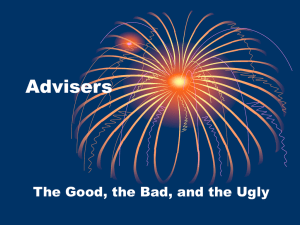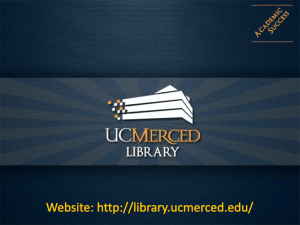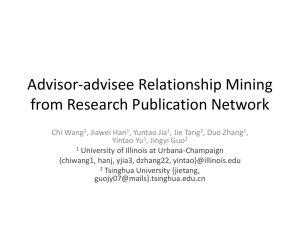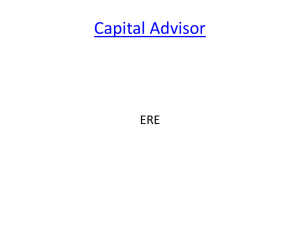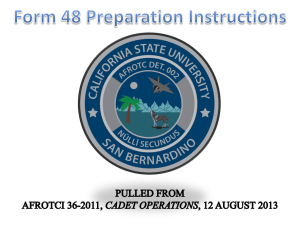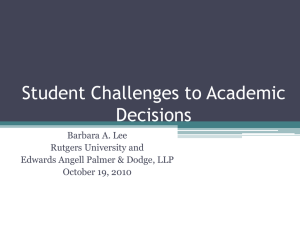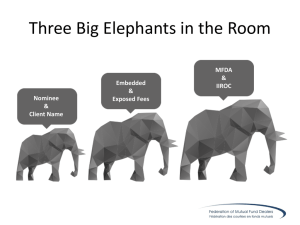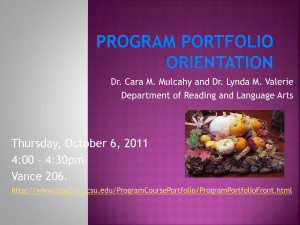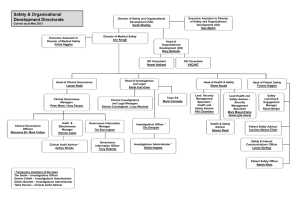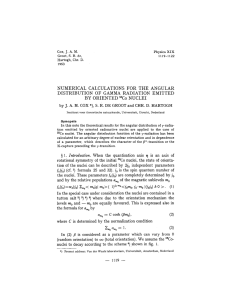Slides
advertisement
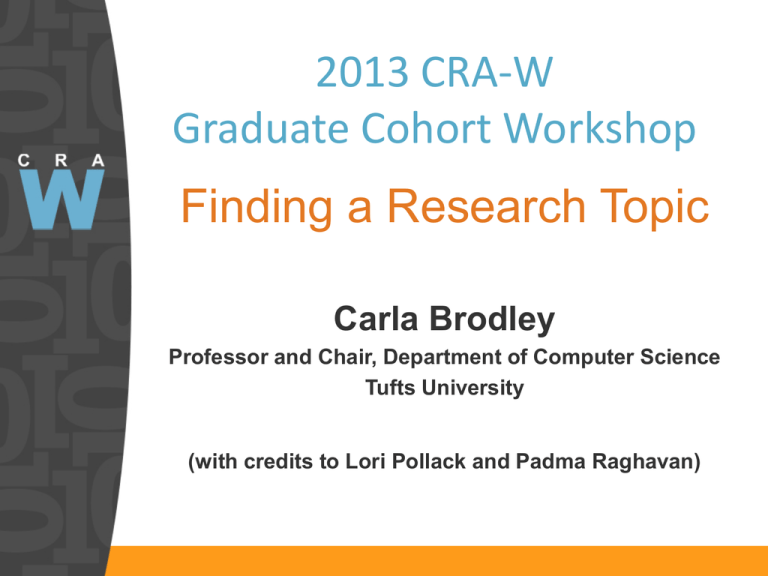
2013 CRA-W Graduate Cohort Workshop Finding a Research Topic Carla Brodley Professor and Chair, Department of Computer Science Tufts University (with credits to Lori Pollack and Padma Raghavan) Academic History • • • • • • Started graduate school, UMASS…………….Fall 1988 Ph.D. awarded………………………………….Aug 1994 Started as Assistant Professor, Purdue….….Nov 1994 Promoted to Assoc. Prof. w/ tenure ………Spring 2000 Started as a Full Professor, Tufts ..………..…Fall 2004 Department Chair, Tufts……………………….Fall 2010 The Thesis Equation Topic + Advisor = Dissertation What is (CS) Research? • the systematic investigation into and study of materials, sources, etc., in order to establish facts and reach new conclusions Oxford dictionary – Experimental scientific research: • Observe a problem • Formulate a hypothesis • Develop a strategy to solve problem based on hypothesis • Perform experiments and demonstrate conclusive evidence • Interpret results What is (CS) Research? • the systematic investigation into and study of materials, sources, etc., in order to establish facts and reach new conclusions Oxford dictionary – Theoretical scientific research: • Identify an open question • Formulate a hypothesis • Prove hypothesis Research is not knowing the answer or how to get it What is CS Research? Example from Machine Learning Classification k-Nearest Neighbor oo o oooo o oo xxx x x x xx x ? Classification k-Nearest Neighbor oo o oooo o ? oo xxx x x x xx x Classification k-Nearest Neighbor o o oooo o ?x o xx x x x xx x oo Assign majority class of the k nearest neighbors What is CS Research? Example from Machine Learning • Observe a problem: Performance of k-NN is little better than random guessing for a particular dataset • Hypothesis: Classification accuracy will improve if I can find and eliminate irrelevant and noisy features. • Strategy: Develop a feature selection algorithm: eliminate features with low correlation with the class label • Evaluation/Evidence: Implement and compare accuracy of original k-NN to new feature selection kNN across a large number of data sets. • Interpret results: Feature selection improves performance in M of the N datasets, …next steps????? So, what isn’t PhD research? How do I choose a topic area for my research? • Whose interest do you need to grab? – You – Your advisor – Your research community • Love your topic! – Sets the course for your next 2-3 years – Determines, in part, opportunities offered to you upon graduation – May work in same/related area for years More Things to Consider • What are your strengths? weaknesses? – Programming, design, data analysis, proofs – Key insights versus long/detailed verification/simulation • What drives you? bores you? – Technology, puzzles, applications, interdisciplinary • Do you (i.e., your advisor) have funding for you to work in the area? – Working as a TA – Working as an RA – Having university/college, government, industry, etc… fellowship/scholarship/grant Which comes first? Advisor or Topic Area? • For many people “advisor before topic” – Meet faculty member with compelling research interests • For some people “topic before advisor” – Need a guide in an area already of great interest to you • Want an advisor – Knowledgeable about your topic • Interdisciplinary topics may require >1 advisor – With compatible working style (e.g., solo vs team) – With lots of research ideas – With strong interest in working with PhD students Focusing from Area to Topic • Area = subfield – architecture, theory, AI, high performance computing, or interdiscplinary – Is it important? Timely? Jobs in the area? • Topic = specific open problems in subfield – – – – – Theory: provably better algorithm AI: Improving a machine learning algorithm Architecture: multicore cache design HPC: parallel algorithm, scheduling scheme Interdisciplinary: computer simulation of tumor growth Topic Scale and Scope • Scale – Should have more than one open problem, or solving one should lead to another – Should lead to more than one result/finding, some big, some smaller • Scope – Too narrow, e.g., just analysis no experiment, many not leave enough room – Too broad, e.g., data mining, for what? why? too open ended Selecting a Topic • Moving from coursework to picking a topic is often a low point – Even for the most successful students • Why? – Going from what you knowcoursework, to something newresearch – It is very important – There is no *one* ideal way, but many good ways 7 Ways to Identify a Good Research Problem 1) Flash of Brillance • You wake up one day with a new insight/idea • New approach to solve an important open problem • Warnings: – This rarely happens if at all – Even if it does, you may not be able to find an advisor who agrees 2) The Apprentice • Your advisor has a list of topics • Suggests one (or more!) that you can work on • Can save you a lot of time/anxiety • Warnings: – Don’t work on something you find boring, fruitless, badly-motivated,… – Several students may be working on the same/related problem 3) The Extended Course Project • You take a project course that gives you a new perspective • The project/paper combines your research project with the course project – One (and ½) project does double duty • Warnings: – This can distract from your research if you can’t find a related project/paper 4) Redo … Reinvent • You work on some projects – Re-implement or re-do; Evaluate – Identify an improvement, algorithm, proof • You have now discovered a topic • Warnings: – You may be without “a topic” for a long time – It may not be a topic worthy of a doctoral thesis 5) Analyze Data • You participate in more senior student’s evaluation study: – Help with data collection and analysis – Identify open challenges • You have now discovered a topic • Warnings: – You will have to agree on who works on identified open challenges – It may not be a topic worthy of a doctoral thesis 6) The Stapler • You work on a number of small topics that turn into a series of conference papers • You figure out somehow how to tie it all together, create a chapter from each paper, and put a BIG staple through it • Warning: – May be hard/impossible to find the tie 7) The Synthesis Model • You read papers from other subfields in computer science or a related field • Look for places to apply insight from another (sub)field to your own – E.g., machine learning to compiler optimizations • Warnings: – You can read a lot of papers and not find a connection – Or realize someone has done it already! – Or you have not made a significant impact in either field Tips and Suggestions • Topic + advisor are both important • Keep a research ideas “journal” (wiki) • Keep an annotated bibliography (bibtex) • Follow your interests and passion – Key driver for success and impact • Are you eager to get to work, continue working? • If not really interested, adapt – Tedium or actual lack of interest and motivation? When you’re stuck at the start • Read/present papers regularly to find open research issues – Practice summarizing, synthesizing & comparing sets of papers – Write your own slides for presentations • Work with a senior PhD student on their research • Try something…. • Get feedback and ideas from others: conferences, research internships, advisor’s idea When you’re still stuck… • Read a PhD thesis in your area – Often contain an ‘open problems’ or ‘future work’ section • Read your advisor’s grant proposals • Attend PhD oral exams and thesis defenses – Understand how to formulate problems – Understand what constitutes a problem solution • Assess your progress, with your advisor – Set goals per semester - Have you ruled out an area? converged on an area? Chosen a topic for an exploratory research project? When you’re stuck again • Divide your topic into milestones, and develop a plan to work on them one-byone – Reward yourself when you finish a milestone – Publications and/or posters as milestones – Vary what you do during the day, but set aside blocks of time for each activity • Assess your progress regularly, with your advisor – Have you submitted a workshop paper? A term project with documentation? A poster at a conference? A talk at a regional conf? When you’re really really stuck • Change research topics? – May move you out of your advisor’s comfort zone of expertise – Starting from “scratch” (e.g., need to learn the related work in a new area) • Change research advisor? – May go through ‘shakedown’ period again – May or may not be better off • But change can be invigorating – What’s hard? Need to recognize when things are not working out and take action – Weigh consequences of changing and not changing The Six Questions…. (from Paul Utgoff) • What research issue(s) interest you most? Why? • Who else has worked in this vein? What did they accomplish? What can't they do? • What kind of progress would you like to see? Why? • Do you have an idea for making some such progress? Explain. • What do you expect to discover from your investigation? • How will your expected result(s) affect the research community? So how did I find my topic? • At ICML1990, I was irritated by – “Yet Another Learning Algorithm (YALA)” – Strategic selection of UCI benchmark datasets to show YALA’s superiority • My idea: Given a dataset, select the “best” algorithm automatically for that dataset • My next observation: Why should we assume all parts of the data space have the same bias? • My next idea: Recursive automatic bias selection Identify a research topic and get started! Great relevant article in ACM Crossroads, “How to Succeed in Graduate School: A Guide for Students and Advisors”, (part I, Dec 1994; part II, Feb 1995), available in ACM Digital Library

